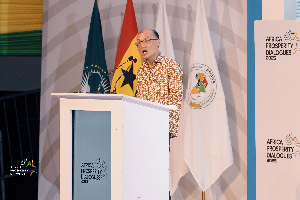There is little doubt that the SSNIT pension scheme as we have it today has not adequately addressed the retirement needs of workers. Even its long-term financial sustainability is in doubt as research has shown that the ratio of contributors to retiring beneficiaries has been consistently deteriorating for some years now in spite of a youthful national population structure which should indicate otherwise. The problems not only stem from SSNIT?s inability to rope in workers in the burgeoning informal economy but also from the distraction from its core functions by political coercion into the Students Loan Scheme which it badly managed and recently the National Health Insurance Scheme which have all added additional pressure.
With regard to the Students Loan Scheme, while SSNIT has always created the impression that beneficiaries have deliberately refused to pay back their loans, the real problem rather lies in SSNIT?s inability to establish very simple and efficient structures that should facilitate loan repayments. Other problems include SSNIT?s record of investing in many projects that have yielded negative real returns over the years due to political interference, lack of competition and probably inadequate investment expertise at SSNIT.
Many have also complained about the fund?s bloated workforce and inefficiently high operational expenses not to mention its failure to regularly communicate to contributors updates on their contributions to the fund.
As the national debate on pensions heats up, there are a number of policy initiatives that could be considered in this debate not only to address SSNIT?s own problems but also to ensure a better pension for all workers.
First of all, it is important for workers and employers to be encouraged to invest outside the SSNIT system into private pension, provident and mutual funds towards retirement. Currently, the playing field is not level to encourage this to blossom primarily because while contributions to the SSNIT fund are tax deductible, contributions to private pension and mutual funds are not. This punitive tax system only serves to discourage workers and their employers from investing in alternative schemes which also negatively affects overall capital formation. It is critical that this tax disincentive is removed.
Secondly, there is a need to introduce effective competition into the pension fund management industry as this should significantly help to improve efficiency in the management of pension funds. Competition will also provide strong incentives for fund managers to device effective strategies to rope in workers in the informal sector. In a nutshell, this means the pension market will need to be liberalised in such a way that workers will have alternatives to choose from. While it is critical to make contributions towards pension compulsory, we must have a system where the worker can choose who should manage his pension and the type of fund he wants to contribute to. Workers should be able to choose from varieties such as benefit-defined pension schemes as we have at SSNIT or contribution-defined pension schemes among several others. The monopolistic position of SSNIT as it is now only encourages complacency, inefficiency, imprudent investments and provides little incentive for capital mobilization. In developing countries such as Chile where the pension industry was liberalised and the monopoly of the national fund was removed, there was a significant increase in capital formation and it served as the genesis for a revolutionary growth in their capital markets. The outsourcing of some of the fund management activities by the national pension fund to investment management companies with strong records can also help ensure more prudent and efficient investment of contributors? funds.
Thirdly, a more serious attention needs to be paid to the development of our capital market to create investment opportunities for pension funds. Our government and companies for instance should explore the possibility of issuing properly benchmarked long-term debt securities to finance infrastructural and long-term projects that could be ideal investments for pension funds while more visible efforts have to be made to employ the stock exchange in the governments divestiture programme. The days where government sells off its investments in blue chip companies outside the stock exchange mechanism on flimsy excuses for parochial interests should be done away with. The sale of government?s interest in Barclays Bank and Coca Cola recently are examples of missed opportunities to strengthen our capital market. SSNIT itself can play a leading role in this regard as well by using its influential equity stake in many unlisted businesses to get them listed on the stock exchange. A bonus from such a move will be an improvement in corporate governance through the discipline fostered by being listed on the GSE. Furthermore, it is on record that SSNIT?s investments in listed equities have yielded the highest return in its investment portfolio thus strengthening the case for encouraging the unlisted businesses in its investment portfolio to list on the stock exchange.
An amendment to the exchange control regulations to enable investment and pension funds to invest offshore some portion of their portfolios for risk management purposes also deserves some attention. This can help significantly in hedging foreign exchange risk that pension and investment funds face in times of rapid depreciation of the cedi which tends to erode the value of workers contributions in real terms. It will also create diversified investment opportunities for the funds where local opportunities are in short supply.
Also, we cannot take advantage of our youthful national population structure to build a sustainable national pension system unless we see more proactive steps on the part of our government and businesses to formalise the burgeoning informal economy. Not only has the dominance of the informal economy robbed government of essential tax revenues but its very nature is such that it is very difficult to rope it into a national pension system. In fact, the dominance of this sector in our economy is a principal hindrance to building a more resilient economy especially because it discourages foreign direct investment.
Reverting to the state pension scheme (CAP 30) for civil servants as some argue may not be the panacea to the problems of pensions in Ghana. The system will only impose additional pressure on the country?s perennial fiscal problems unless workers are willing to pay more tax to finance it but we all know the tax system is already overburdening given income levels in Ghana. Besides, it is not an equitable system to tax all workers while only a portion of them benefit from state pension financed by the taxes everybody else pays. Probably a good compromise is to get the government to provide a basic state pension for civil servants just as many private sector employers contribute to provident funds on behalf of their workers but it should be made compulsory for civil servants to make supplementary contributions deducted from incomes at source to alternative schemes.
For now, however, it is important for SSNIT to show more accountability and responsibility to contributors, increase its operational efficiency while government must take effective steps to ensure more autonomy for SSNIT to facilitate more efficient investment decisions.



















